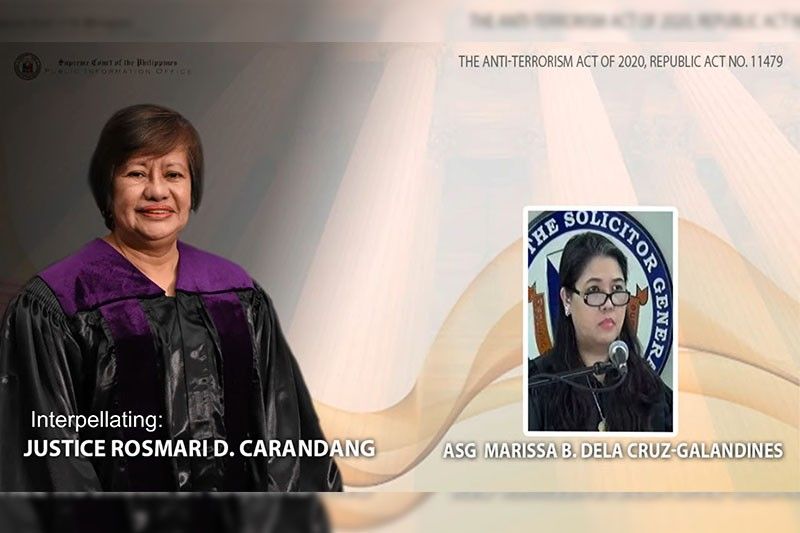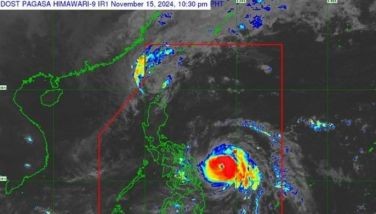OSG lawyers wither during interpellation on anti-terror law

MANILA, Philippines — In the resumption of the highly-anticipated debates on the petitions against the anti-terrorism law, Assistant solicitors general tasked to defend the government in the case fumbled during interpellation.
Associate Justice Rosmari Carandang was the first magistrate to quiz the respondents, represented by Solicitor General Jose Calida and his assistant solicitors general.
Calida delivered the opening statement but delegated fielding questions to his officials.
On surveillance
Section 16 states that law enforcement agents or military agents may, upon written order from the Court of Appeals, secretly wiretap or listen in on any private communication between proscribed and designated terrorists or those charged with violations of the anti-terrorism law.
In her interpellation, Carandang asked: When does surveillance start?
Assistant Solicitor General Marissa Dela Cruz-Galandines initially agreed with Carandang that the government cannot conduct surveillance without authorization from the appeals court.
But the justice pointed out that for the government to obtain written authority from the court, they would have to present intelligence reports containing confidential information also gathered from surveillance.
“So that the government is into surveillance informal surveillance before going into a formal surveillance to be obtained upon application from the court of appeals. Is the government not violating any rules on the right to privacy because they are government agents conducting informal surveillance?” Caradang continued.
Galandines asserted that this is a matter involving national security, “therefore, your honor, we believe that there is no violation by the government in doing so.”
On designation
A majority of the petitioners assailed the Anti-Terrorism Council’s power to designate a person or a group as terrorist—they argued that this encroaches upon judicial powers.
Galandines asserted that the designation would only trigger the powers of the Anti-Money Laundering Council to freeze the assets of the designated terrorists and sholud not authorize arrests.
Caradang repeatedly asked Galandines if she is certain this is the only effect of a designation. The latter later answered that designation is “without prejudice to the eventual filing of an action for proscription” which would be filed before courts.
But what steps would the Department of Justice take when it files the petition for proscription, the justice pressed. “What would be the support? Is just that it is plainly an application or an application appended with some other things some other information?”
Galandines paused and, before she could answer, got more questions from Carandang. The government lawyer in the end said the National Intelligence Coordinating Agency, which would recommend action, may be better suited to answer the justice’s question.
On delisting
Carandang brought up a Philstar.com report that the Anti-Terrorism Council has yet to craft internal rules for its process of delisting, according to the Department of Justice.
Under the Implementing Rules and Regulations of Republic Act 11479 or the Anti-Terrorism Act of 2020, a designated terrorist may request delisting before the ATC within 15 days of the publication of their name. The section also lists six grounds for delisting, and how frequently the appeal may be filed.
Although asked, DOJ Undesecretary Adrian Sugay, who is also the ATC's spokesperson, did not say whether the council would require documents to be submitted or if hearings would be conducted for delisting.
Assistant Solicitor General Raymund Rigodon said he is not aware of developments on this.
Carandang said they would have to wait for the issuance of the ATC’s internal rules on this.
Sugay, in an earlier interview, said: “[T]he delisting procedure may already be used. As I said, it is already in the IRR and parties designated are entitled to file such verified request as a matter of right.”
RELATED: 'Mother of red-tagging': No process yet to remove names from terror list
On warrantless arrest
Section 29 of the law states that State agents, authorized by the ATC to take custody of a suspected terrorist, will not incur criminal liability when they detain a person for 14 days—extendible by another ten days—before the detainee is brought before judicial authorities.
Galandines said that the circumstances in this provision mirror Section 5, Rule 113 of the Revised Rules on Criminal Procedure that provides that there are only three instances when a warrantless arrest is lawful:
- When a person is caught committing the crime
- When a crime has just been committed and arresting officer has probable cause to believe based on his personal knowledge on the circumstances
- When the person is an escaped prisoner.
Carandang pointed out partly in Filipino: “If you look at the items there, it talks of personal knowledge. What is the ATC’s personal knowledge in this, if police, state agent, or a citizen, witnessed [the crime] why would ATC issue a warrantless arrest when they did not witness it?”
The government lawyer asserted that the ATC will not issue a warrant of arrest.
But the justice asked whether the ATC would not actually be issuing a detention order. Carandang continued: "Isn’t the authority to detain equivalent to authority to arrest? You will arrest before you detain?"
RELATED: Justice Caguioa asks: Is detention under Anti-Terrorism Act similar to a warrant?
Galandines asserted: “Your honor please, may we respectfully disagree the law enforcers can arrest following by virtue of a valid warrantless arrest… The participation of the ATC would come after the arrest, the valid warrantless arrest has already been effected and the ATC would now participate by allowing the detention for more than three days.”
Carandang pointed out: That is not what is written in the law.
The justice then told Galandines to expound on the government's defense of Section 29 of the law. “Because this is a very contentious provision, the court would like to see the government position on this,” she added.
Carandang will continue her interpellation of the government lawyers in the next session, on May 4.
- Latest
- Trending
































